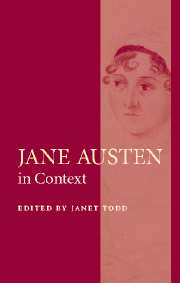34 - Professions
Published online by Cambridge University Press: 19 December 2020
Summary
During the second half of the eighteenth century, the traditional ‘learned professions’ – the church, the law and medicine – took on a new and distinctive social character as the ‘liberal professions’, ‘liberal’ in the sense of befitting a gentleman. Together with the army and the navy – known as the profession of arms – they came to be regarded as suitable occupations, both socially and financially, for the sons of gentlemen. Since the eldest son would inherit the family estate, this applied to younger sons in particular. As Mary Crawford points out, ‘there is generally an uncle or a grandfather to leave a fortune to the second son’ (MP, 1:9); or he might inherit money or land from his mother's side of the family. If not, along with the other younger sons, he would be left to make his own way in the world, to earn a living in one of the gentlemanly occupations that the liberal professions could provide. In the colder moral climate that arrived towards the turn of the century, employment came to be valued for its own sake as a force in character building and a safeguard against idleness, benefits available to eldest and younger sons alike. This thinking stands behind General Tilney's pronouncement. He considers ‘it expedient to give every young man some employment’ (NA, 2:7).
As to which profession, the army was the favoured choice of aristocratic families; the navy offered fame and fortune; the law was well regarded for its earning power and its usefulness in a political career; the church was rising steadily in remuneration and status; while in medicine only the Fellows of the Royal College of Physicians, fewer than two hundred of them, were accepted as the gentlemen of the profession. Very often the choice was determined by family tradition. There were established medical, legal, clerical and service families; and in a society where patronage and connections counted for so much, the well-trodden family path could be the most profitable road to choose.
- Type
- Chapter
- Information
- Jane Austen in Context , pp. 366 - 376Publisher: Cambridge University PressPrint publication year: 2005

